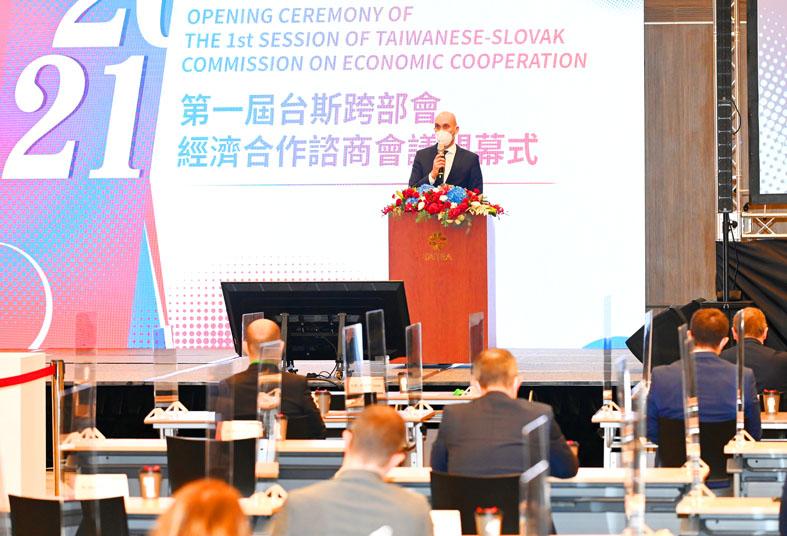Taiwan and Slovakia are headed for closer trade relations, Slovak Second State Secretary of the Ministry of Economy Karol Galek said yesterday at the Taiwanese-Slovak Commission on Economic Cooperation meeting in Taipei.
Taiwan and Slovakia’s cooperation during the COVID-19 pandemic proves the countries’ ability to work together as equal partners “in good times and the bad,” and Slovakia is ready to work with Taiwan as “small but open economies” to “find our place in an ever-changing global economy,” Galek said.
“I believe that [the meeting] will bring far-reaching discussions, allowing both sides to make the best of their economic potential for future cooperation,” he said.
Galek said he met with National Development Council (NDC) Minister Kung Ming-hsin (龔明鑫) early yesterday, when they discussed specific areas of potential cooperation, including on smart cities, space industries, electric vehicles and semiconductors.
Both sides agreed to create a working group to explore areas of cooperation in research and development, among other fields, he said.
“Slovakia supports Taiwan,” said Galek, who is leading a delegation of 18 senior officials and 25 businesspeople from Slovakia.
Kung, who led a 66-member delegation to Slovakia in October, when seven memorandums of understanding were signed, said that Slovakia and Taiwan should deepen trade relations.
“As Taiwan and Slovakia are both free, democratic partners with shared values, we have signed agreements since establishing offices in each other’s countries to avoid double taxation, foster technology cooperation, the establishment of e-government services, economic cooperation, working holidays and many other topics,” Kung said.
Trade between the countries has grown rapidly and Slovakia receives the second-highest investment from Taiwan among EU countries at 500 million euros (US$564.64 million), creating 3,000 Slovak jobs.
“After visiting Slovakia in October, many Taiwanese companies are willing to increase their investments in Slovakia,” Kung said.
Taiwan’s donation of masks to Slovakia in the early days of the COVID-19 pandemic and Slovakia’s later donation of 160,000 vaccines to Taiwan formed the basis of trust between the two nations, he said.
“The mutual donations became what President Tsai Ing-wen (蔡英文) described as a ‘circle of good,’” Kung said.
“We hope that this circle can be extended to the economic realm,” he said.
Director-General of Economic and Development Cooperation at Slovakia’s Ministry of Foreign Affairs Lucia Kiss said in her opening address that the talks “open a wave of active and direct consultations between the ministries of both countries, and it is an important historic event in our bilateral relations.”
That the Slovak delegation decided to visit Taiwan despite the COVID-19 pandemic shows that Slovakia is determined to “deepen and upgrade economic relations with Taiwan,” she said.
Yesterday’s opening ceremony was also attended by Deputy Minister of Foreign Affairs Tien Chung-kwang (田中光) and Deputy Minister of Economic Affairs Chen Chern-chyi (陳正祺).
The Slovak delegation is visiting Taiwan until Friday.
Additional reporting by CNA
Source: Taipei Times - 2021/12/07





















